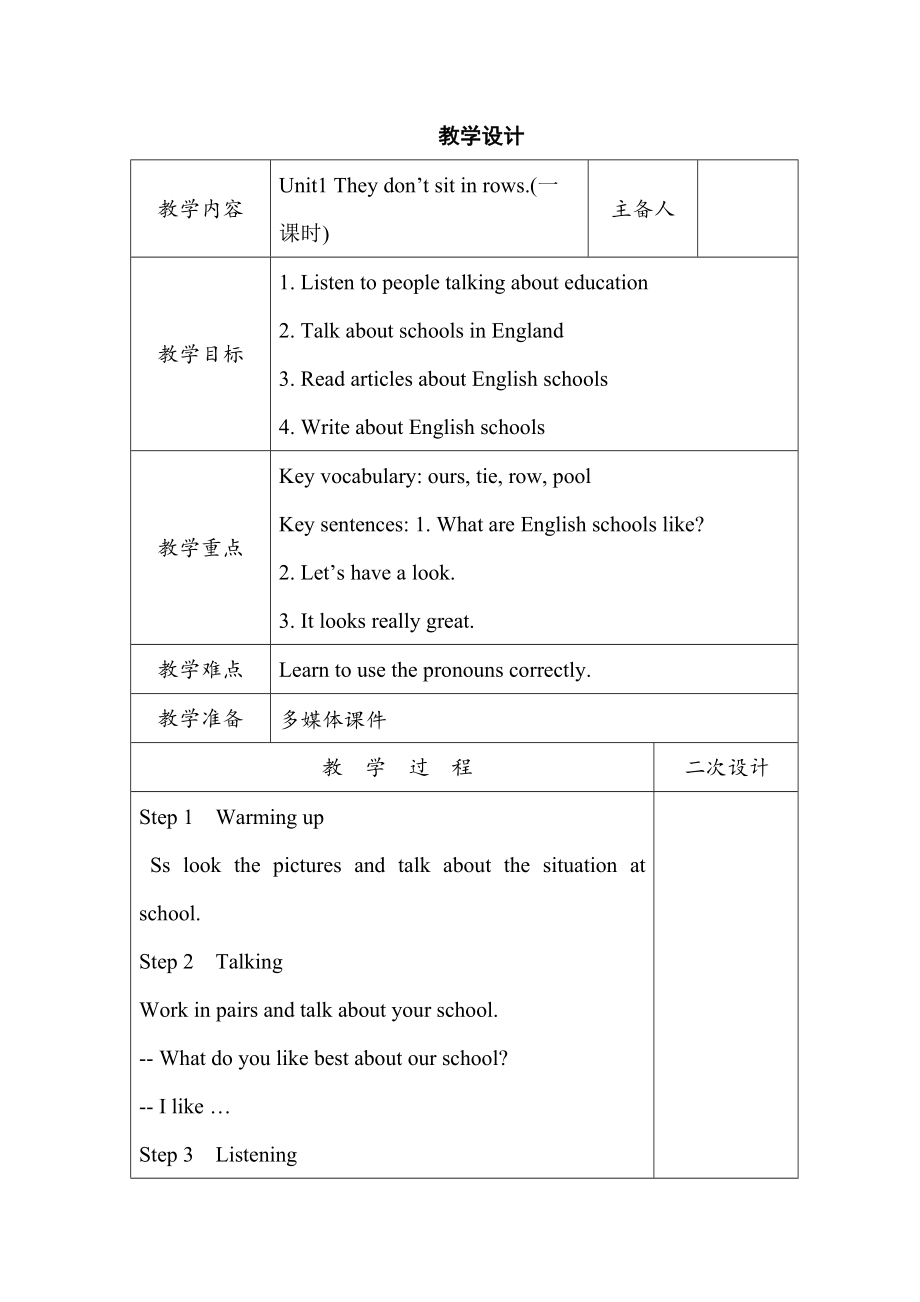《外研版九年級(jí)英語下冊(cè)教案 Module2 Unit 1(表格式教案)》由會(huì)員分享�,可在線閱讀�����,更多相關(guān)《外研版九年級(jí)英語下冊(cè)教案 Module2 Unit 1(表格式教案)(5頁珍藏版)》請(qǐng)?jiān)谘b配圖網(wǎng)上搜索�。
1�、教學(xué)設(shè)計(jì)
教學(xué)內(nèi)容
Unit1 They don’t sit in rows.(一課時(shí))
主備人
教學(xué)目標(biāo)
1. Listen to people talking about education
2. Talk about schools in England
3. Read articles about English schools
4. Write about English schools
教學(xué)重點(diǎn)
Key vocabulary: ours, tie, row, pool
Key sentences: 1. What are English schools
2、 like?
2. Let’s have a look.
3. It looks really great.
教學(xué)難點(diǎn)
Learn to use the pronouns correctly.
教學(xué)準(zhǔn)備
多媒體課件
教 學(xué) 過 程
二次設(shè)計(jì)
Step 1 Warming up
Ss look the pictures and talk about the situation at school.
Step 2 Talking
Work in pairs and talk about your school.
-- What do you like b
3����、est about our school?
-- I like …
Step 3 Listening
1. Finish Activity 2: Listen and complete the sentences.
1. The weather was ______ when Tony was in London.
2. Tony played football with _________________________________________.
3. Daming is surprised to hear that Tony _____________________
4、___.
4. Tony didn’t go to lessons. He was ___________.
2. Listen and read the conversation, then answer the questions.
1. How many pupils are there in Susie’s school?
2. Is everyone sitting around tables or sitting in rows in England?
Step 4 Reading
1. Read and complete Susie’s column in
5���、the table.
2. Read again and answer the questions.
(1) Who did Tony visit in London?
(2) How did Tony get the photos of Susie’s school?
(3) Which class is a bit bigger, Susie’s or Daming’s?
(4) What does Betty hope to do one day?
Step 5 Language points
1. Did you enjoy yourself in London?
6�、
yourself是反身代詞, 意為“你自己”��。復(fù)數(shù)為yourselves.
enjoy oneself 表示“玩得高興”, 相當(dāng)于 have fun或have a good time�����。
e.g. They enjoyed themselves last week.
2. So ours is a bit bigger.
ours是名詞性物主代詞, 意為“我們的”, 在句中相當(dāng)于our class����。
e.g. Her coat is beautiful, but ours is more beautiful.
3. Look,
7、everyone is wearing a jacket and tie!
everyone是不定代詞, 意為“每個(gè)人”����。
tie作名詞時(shí)意為“領(lǐng)帶”; 作動(dòng)詞時(shí)意為“系東西”�����。
4. They don’t sit in rows.
row意為“一排, 一行, 一列”。
sit in rows表示“按排坐”��。
5. Look at the swimming pool and the huge sports ground.
pool意為“水池, 游泳池”����。
swimming pool表示“游泳池”。
spor
8����、ts ground表示“運(yùn)動(dòng)場(chǎng)”。
Step 6 Practice
Finish Activity 5: Complete the sentences with the correct form of the words in the box.
enjoy pool row tie wear
Pupils in England do not sit in (1)______ in the classroom. They sit around tables. Everyone (2)_______ a jacket and (3)_____. Most schoo
9�����、ls have sports grounds, and English children (4)_______ playing football, just as pupils in China do. Some English schools have swimming (5)______, but not all of them do.
Step 7 Pair work
1. Complete the Your school column in Activity 3.
2. Compare your school with Susie’s school.
Step 10 Exe
10����、rcises
1. Our class enjoyed ______ in the museum.
A. yourself B. ourselves C. us
2. -- Where is your class?
-- _______ is on the second floor.
A. Our B. Ours C. We
板書設(shè)計(jì)
Key vocabulary: ours, tie, row, pool
Key sentences: 1. What are English schools like?
2. Let’s have a look.
3. It looks really great.Unit1 They don’t sit in rows.
作業(yè)布置
1. Read and recite the words and phrases by heart.
2. Prepare for Unit 2.
教學(xué)反思
 外研版九年級(jí)英語下冊(cè)教案 Module2 Unit 1(表格式教案)
外研版九年級(jí)英語下冊(cè)教案 Module2 Unit 1(表格式教案)

